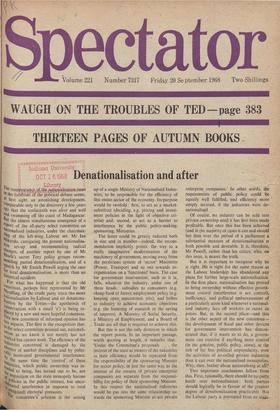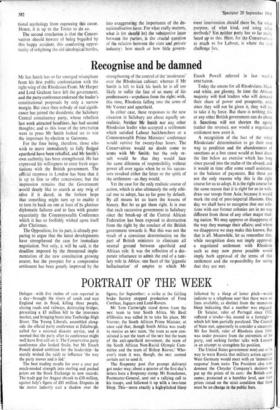Jar ( T h e re a ,pqgo , Ris t s3,(„the LI a I isatkOssue to the
forefennt of- the political debate seems, at first sight. an astonishing development, comparable only to the discovery a few years ago that the coelacanth was alive and well 4 [d swimming off the coast of Madagascar. kit the almost simultaneous emergenee of a tetiert of the all-party select committee on nationalised industries, under the chairman- sh; le of the left-wing Labour MP, Mr Ian ti ikardo, castigating the present nationalisa- ch41 set-up and recommending radical anges, of another report by one of Mr Heath's secret Tory policy groups recom- mending partial- denationalisation, and of a Peeeb by Mr Enoch Powell urging the case fo for total denationalisation, is more than an historical accident. For what has happened is that the old eelasensus, perhaps best represented by Mr 4udling, of the crude party truce (no more nationalisation by Labour and no denationa- li ation by the Tories—the apotheosis of ecinservatism with a small 'c') is being re- 'iced by a new and more hopeful consensus. this new consensus of informed opinion has s' aspects. The first is the recognition that, aS the select committee pointed out, nationali- "°11 as we know it not merely has not vv up of a single Ministry of Nationalised Indus- tries, to be responsible for the efficiency of this entire sector of the economy. Its purpose would be twofold : first, to act as a market- substitute (deciding, e.g. pricing and invest- ment policies in the light of objective cri- teria) and, second, to act as a barrier to interference by the public policy-making, sponsoring, Ministries.
The latter could be greatly reduced both in size and in number—indeed, the recom- mendation implicitly points the way to a really imaginative modernisation of the machinery of government, moving away from the pernicious system of 'sector' Ministries (Power, Transport and so on) towards re- organisation on a 'functional' basis. The case for government intervention, such as it is, falls, whatever the industry, under one of three heads : subsidies to consumers (e.g. cheap food or fares); employment policy (e.g. keeping open uneconomic pits); and bribes to industry to achieve economic objectives (e.g. the fostering of research or the saving of imports). A Ministry of Social Security, a Ministry of Employment, and a Board of Trade are all that is required to achieve this.
But this is not the only direction in which the report points. In an important passage, worth quoting at length, it remarks that: `Under the Committee's proposals . . . the interest of the state as owners of the industries in their efficiency would be separated from the responsibility of the sponsoring Minister for sector policy, in just the same way as the interest of the owners of private enterprise companies are separate from the responsi- bility for policy of their sponsoring Minister. In this respect the nationalised industries would be put into the same relationship to- wards the sponsoring Minister as are private enterprise companies.' In other words,. the requirements of public policy could be equally well fulfilled, and efficiency more simply secured, if the industries were de- nationalised.
Of course, no industry can be sold into private ownership until it has first been made profitable. But once this has been achieved (and in the majority of cases it can and should be) then over the period of a parliament a. substantial measure of denationalisation is both possible and desirable, It is, therefore, Mr Powell, rather than his critics, who, on this issue, is nearer the truth.
But it is important to recognise why he is right. He is right for the same reason as the Labour leadership has abandoned any plans for further large-scale nationalisation: In the first place, nationalisation has proved to bring ownership without effective govern- ment control (interference is not control). inefficiency, and political embarrassment of a particularly acute kind whenever a national- ised industry lays off workers or raises its prices. But, in the second place--and this is the other aspect of the new consensus— the development of fiscal and other devices for government intervention has demon- strated that, if it wants so to do, a govern- ment can exercise if anything more control (in the genuine, public policy, sense), at the risk of far less political unpopularity, over the activities of so-called private industries than it can over the nationalised monopolies. Why, then, bother about nationalising at all? tional mythology from espousing this cause. Hence, it is up to the Tories to do so.
The second conclusion is that the Conser- vatives should beware of being beguiled by this happy accident, this comforting oppor- tunity of relighting the old ideological battles, into exaggerating the importance of the de- nationalisation issue. For what really matters, what is (or should be) the substantive issue between the parties, is the crucial question of the relation between the state and pri►'ate industry: how much or how little govern- ment intervention should there be, for what purpose, of what kind, and using what methods? Yet neither party has so far really faced up to this. Here, for the Conservatives as much as for Labour, is where the real challenge lies.











































